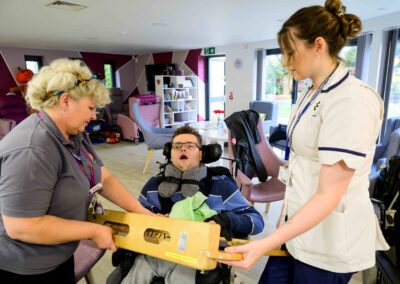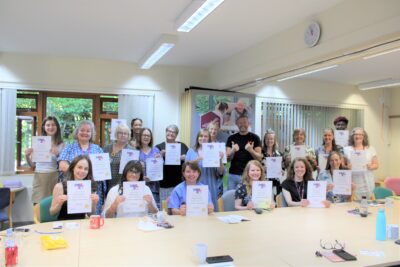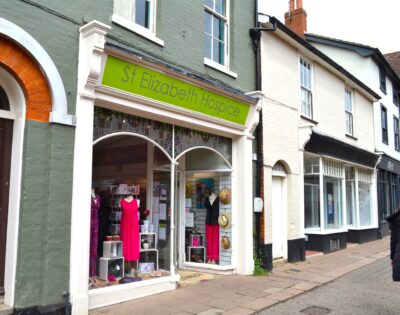Sarah Woodhead’s Story
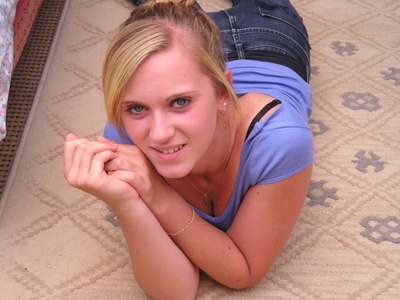
Teenager Sarah Woodhead lived for her horses. She would ride one of her family’s horses every day if she could. Her spare time would be spent mucking out and caring for them. And she was doing an equestrian course at Otley College as part of her Kesgrave High GCSE schooling. She was fit and active.
But when she was 16 she became seriously ill. She had been feeling unwell since May but it was when she was enjoying a family summer holiday in Spain that she developed a severe cough, chest pain and her neck swelled up.
Her mum Hazel Woodhead said: “On the night we got back home she was not well at all, she was coughing. So the next day we went to the doctor who said her glands were swollen, she had a chest infection and she was given antibiotics.”
Two days later, it was August bank holiday Monday in 2008, and Sarah’s condition had worsened. She was unable to get out of bed and the cough persisted so Mrs Woodhead and her husband Gordon took her to the Riverside Clinic in Ipswich to get her checked over again.
Mrs Woodhead said: “A doctor saw her and said she thought her thyroid had packed up and we had to go to the Ear, Nose and Throat (ENT) department at Colchester General Hospital. There, they put a scope down her throat and wanted to do a scan. Unknown to us they already had a clue what was wrong and they called intensive care. Within three hours of us getting there they told us she had lymphoma. Her chest, her heart, her neck were completely covered in tumours.”
Later she was transferred to Ipswich Hospital’s children’s ward, but because Sarah was mature for her age, it just wasn’t the right place. She then went to the Norfolk and Norwich Hospital for a biopsy.
Just a week after Sarah had been taken to the Riverside Clinic with what they thought was a chest infection, the results showed she had Hodgkin’s Lymphoma (sometimes called Hodkgin’s Disease), a cancer of the lymphatic system which is diagnosed in just over 1,500 people in the UK each year.
Because of the travelling that would be required from their home in Monewden near Woodbridge throughout Sarah’s treatment, they decided she should return to Ipswich Hospital. Her mum was adamant she would be by her bedside as much as she could.
Sarah’s consultant Dr Dodd advised course of ABVD chemotherapy which is often used as the first-line treatment of Hodgkin’s lymphoma. He wanted to start it without delay. Sarah was given a 50-50 chance of beating the disease.
Mrs Woodhead said: “Sarah was relieved that somebody had actually taken notice that she was ill as she had felt so ill for so many months. She was really positive.”
Sarah was a very shy and private person. She had been brought up with horses and had been riding since the age of six. Her family owned three of them in 2008. She would go hunting and to shows, and as her treatment continued she looked forward to being well enough to go home and get back in the saddle.
Mrs Woodhead said: “In the second week of September, her consultant thought she was responding to the treatment so Sarah was allowed to stay at home and she went back and forth to Ipswich Hospital for the treatment. She was feeling a lot better and she went and rode her horse. She hadn’t lost her hair at all. She had long blonde hair.
We made her a room downstairs and her whole life changed from the minute she came through that door. She never went upstairs again. She couldn’t climb the stairs, she was too weak. We changed the dining room into a room for her.”
Unfortunately after her second dose of chemotherapy her cough returned and an X-ray showed the tumour had stopped responding to the treatment and it was clear a bone marrow or stem cell transplant may be needed. To start this process Sarah’s sister Paula was tested and after weeks of waiting they discovered she was a perfect match.
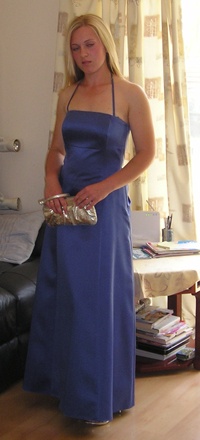
In the meantime Sarah was prescribed a cancer-controlling drug, to keep it at the same level, but she started to feel unwell again. This was just after Christmas 2008 and she was rushed to Ipswich Hospital with flu. She came home a few days later only to be rushed back again and this time put on the cancer ward. It is there she stayed for a few weeks, in a single room, while they organised a bone marrow transplant.
They started Sarah on a huge dose of chemotherapy which took 24hours and was administered through a central line in her chest. She was fine the next day but as she took a shower all her hair fell out.
“I was quite pleased because we realised one of the reasons her hair hadn’t fallen out by this time was because the first chemotherapy wasn’t working. We thought it would mean she would get better. But that night she called us at home saying she didn’t feel well and we rushed back up the hospital. We knew something was seriously wrong. They put her on an ECG and my first thought was it had gone to her heart. She was in pain and they asked Sarah if she would like a morphine driver. At that point we thought ‘this is more serious now’,” said Mrs Woodhead.
And they were right. Dr Dodd broke the news. The treatment had failed and Sarah’s better lung had collapsed. She now only had one lung to breathe with and that was the one filled up with tumour. Sarah asked how long she had left. Twelve weeks was the answer.
“We were all gobsmacked. At the time you still don’t think it is happening to you. They told her she could have anything she wanted in the way of pain relief. The next morning another surgeon said he could give her up to a year by giving her radiation treatment and she said she was prepared to go along with it. Our hopes went up.
One minute we were told she had 12 weeks to live and the next day we were told it might be year and we clung onto that hope.”
They started radiation from the waist upwards and it was meant to continue for five weeks. She wanted to be at home and travelled up every day Monday to Friday for the treatment.
Mrs Woodhead said: “That was the most horrendous treatment anyone could ever have. There was a time when I felt like telling her to give up, not to go through it. It was if she was being fried from the inside out.”
Sarah put up with it and carried on to the end of the treatment. But soon her hopes were dashed. Dr Dodd said Sarah was not going to live and she could be taken home to be cared for.
Mrs Woodhead said: “We were given a care plan and they dropped off a huge bag of medical equipment at our house which I had to put in a safe place. They told us about St Elizabeth Hospice’s Hospice at Home team.”
As the days went by the family contacted the Make a Wish Foundation and were offered a family trip to London for shopping and the musical Chicago. They all went Sarah, her parents, her boyfriend Matthew Sewell and her sister Paula on March 12 2009 – their last family weekend away.
Mrs Woodhead, who had given up work as a mobile hairdresser to care for Sarah, said: “We had a lovely weekend. But Sarah never really got out of the wheelchair. On the Sunday we came home she just wanted to go to bed and on the next day I knew she was feeling really rough. I had looked after Sarah all that time but I knew there would come a point when she would need more pain relief than I could administer.
I phoned up the Hospice at Home team and they sent someone over to help.
“The next afternoon I could tell she was going downhill quite rapidly. I phoned Gordon at work. She was drifting in and out of sleep and by midnight she was really starting to cough, she was on oxygen all the time, and I gave her some of the methadone we had been prescribed to loosen her throat. But it didn’t touch her and she wanted more.
Sarah, I thought, you need something more to help you and ease the pain but she didn’t want anyone to come over. At 3am I had to tackle this. I said to her, if this was one of your horses you wouldn’t let them suffer would you? She said no. And she let me call the Hospice at Home team.
“Hospice at Home nurse specialist Pip Davis answered the phone. It was amazing, she said ‘ I am just putting my horse in its field and I will be right with you.’ I told Sarah the nurse was putting her horse away and Sarah thought that was the right thing to do, to see to her horses first, she liked that.
Twenty minutes later, at 5.30am, Pip walked through the door, introduced herself and went straight in to Sarah. The first thing they talked about was horses. That was so nice.”
Pip gave Sarah a morphine driver and an injection to relax her so she would go off to sleep. It was then Pip said: “It’s not going to be long.”
Mrs Woodhead said: “I didn’t realise she was talking about minutes. I thought Sarah was going to be unconscious for a few days and would slowly fall off to sleep. I went to the kitchen to make a cup of tea and the next minute Pip said, I think you’d better all come in.
The nurse knew exactly what was happening. Sarah had never met the nurse before and that was nice for us. We had built up big relationships at the hospital and everyone there knew Sarah.
It was a great help in those final hours that the Hospice at Home nurse did not show any emotions at all, she was caring, but professional. Pip came out of the room and left us with Sarah. She literally took a breath and she was gone. There was no suffering involved Sarah was gone within seconds. It was all so very quick.”
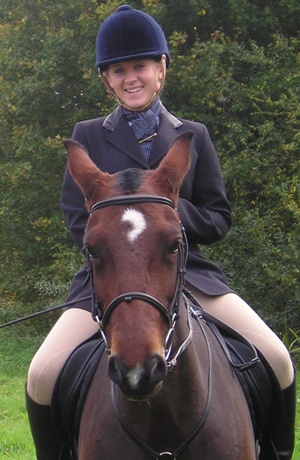
Sarah died at 9.20 am on March 18 2009. She was 17.
Afterwards the nurse took care of things, organised the GP to come and certify the death, removed all Sarah’s tubes and laid her properly on the bed. ” Pip made sure we were all OK,” said Mrs Woodhead. She also gave her advice and leaflets for the weeks to come.
Mrs Woodhead: “Even when I called Hospice at Home during that final night I wondered if I was doing the right thing. We have always been the sort of people who get on with things, you don’t waste doctor’s time.
You always think someone needs help more than you, but it didn’t occur to me at the time that my daughter was dying and that it was me that needed that help.”
Sarah had not spoken of death or what she wanted at her funeral and the only thing she had arranged was who she wanted to look after her horses.
“Sarah wasn’t frightened. She made it quite clear right from the start of her illness she didn’t want anyone being morbid. She only cried once when she was told she only had 12 weeks left. When we cried she got cross with us. It was her way of dealing with it.
The night before she died she said ‘you are all going to carry on life without me’ and I said ‘no we won’t just carry on’. It is the hardest thing when your child dies before you.”
Mr Woodhead said that since that the family have been on autopilot and life just goes on in a daze.
Mrs Woodhead said: “The funeral was awful but I look back and think if we can get through that we can get through anything. The hospice gave us a very good advice and support following bereavement booklet and I referred to it every day after Sarah died. It told us what needed to be done next. “
Find all the information you need to make a donation here.

